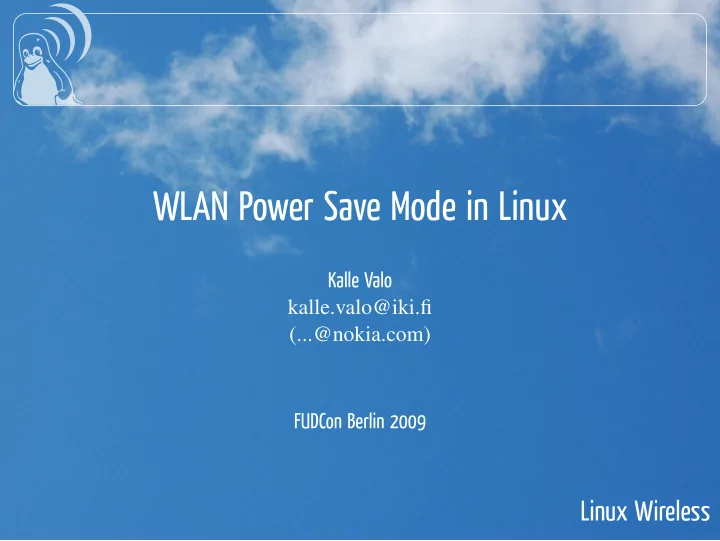

WLAN Power Save Mode in Linux Kalle Valo kalle.valo@iki.fi (...@nokia.com) FUDCon Berlin 2009 Linux Wireless Linux Wireless
Outline 1 Introduction 2 Status 3 Future Linux Wireless Linux Wireless
Introduction Introduction Linux Wireless Linux Wireless
Introduction Why? • Total system power consumption of Nokia N800 (stlc45xx, mac80211, 2.6.29-omap-wl): 1200 1000 800 power (mW) 600 400 200 0 PSM off PSM on PSM + beacon filter WLAN off Linux Wireless Linux Wireless
Introduction Power Save Mode (PSM) simplified • client informs Access Point (AP) of the PSM status with a flag in Frame Control header • AP buffers all unicast, broadcast and multicast frames • AP informs of buffered unicast frames with TIM bits in beacons • AP sends broadcast and multicast frames immediately after the DTIM beacons with a special TIM bit set • AP sends buffered unicast frames either when client wakes up or requests them with a PS-Poll frame Linux Wireless Linux Wireless
Introduction PSM example Linux Wireless Linux Wireless
Introduction Downsides • few ms latency in transmission due to firmware wakeup (depends on hardware) • hundreds of ms latency in receive, depends on: • beacon interval • DTIM period • how often client wakes up for beacons • broken APs → strange packet loss • broken firmware and/or HW, timing is very delicate Linux Wireless Linux Wireless
Status Status Linux Wireless Linux Wireless
Status Dynamic and Static PSM • timeout > 0 → Dynamic PSM • stays awake a certain period after a last transmission • wakes up with Nullfunc • should not affect throughput • in certain cases increases latency considerably, but user won’t notice in practise • timeout = 0 → Static PSM • goes immediately to sleep after transmitting a frame • fetches buffered frames with PS-Poll frame • decreases throughput • increases latency significantly Linux Wireless Linux Wireless
Status User space interface • Wireless Extensions have power and power timeout: • iwconfig wlan0 power timeout 200m • the dynamic PSM timeout value • no support in nl80211, yet • network latency PM QoS interface • /dev/network_latency • how often hardware wakes up for beacons Linux Wireless Linux Wireless
Status mac80211 status • supported HW types: • HW supports PSM (IEEE80211_HW_SUPPORTS_PS) • Stack must create Nullfunc and PS-Poll frames (IEEE80211_HW_PS_NULLFUNC_STACK) • HW has timers for dynamic PSM transitions (IEEE80211_HW_SUPPORTS_DYNAMIC_PS) • drivers supporting PSM: • ath9k • rt2x00 • iwlwifi (was disabled due to bugs, just re-enabled today) • stlc45xx (staging, patches pending) • wl1251 (patches pending) • PSM enabled by default for the drivers which claim to support it, default timeout 500 ms Linux Wireless Linux Wireless
Status Fullmac driver support • unknown, any comments? Linux Wireless Linux Wireless
Status Beacon filtering • in softmac beacons are normally forwarded to the host CPU • wakes up CPU unnecessarily • some HWs support a feature to only forward beacons which have chaned in relevant parts • HW sends an event when beacons are lost Linux Wireless Linux Wireless
Future Future Linux Wireless Linux Wireless
Future Unscheduled Automatic Power Save Delivery (U-APSD) • also known as WMM Power Save • needs QoS support from the applications, otherwise legacy PSM is used Linux Wireless Linux Wireless
Future Improvements to Dynamic Power Save • an interface for the applications to influence the timeout value • use PM QoS network_latency somehow? • more advanced algorithm for adaptation • academic papers available Linux Wireless Linux Wireless
Future User space • nl80211 support • wpa_supplicant: • support to disable PSM? • configure timeout value? • more QoS information from applications? Linux Wireless Linux Wireless
Thanks for listening. Questions? http://wireless.kernel.org/ Linux Wireless
Recommend
More recommend